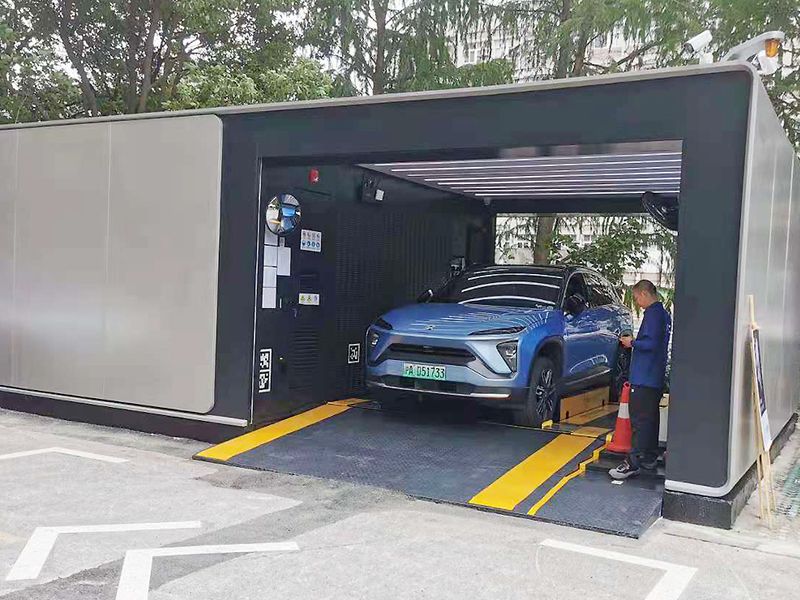
SHANGHAI — In 2016, when BAIC Motor Co., a state-owned automaker, installed its first batch of 10 stations in Beijing to swap batteries for its electric cars purchased by a local taxi company, few other automakers operating in China quickly followed suit.
However, since 2020, construction of battery swap stations has accelerated: The number of battery-swap stations across China surged to 617 as of April 2021 from 306 at the end of 2019, according to the China Electric Vehicle Charging Infrastructure Promotion Alliance, a Beijing-based trade group of EV makers and EV charging service providers.
Battery swapping has yet to take off in the U.S., but a slew of Chinese automakers have started to embrace it as a way to serve their EV customers.
Leading the construction of battery swap infrastructure in China are two young domestic companies: EV startup Nio and Aulton New Energy Automotive Technology Co., which specializes in battery swap station installation and operation.
Nio was incorporated in Shanghai in 2014. Seeking to differentiate itself from its competitors in the domestic EV market, it began to launch battery swap stations in major cities in 2018.
Due to the hefty costs of constructing such a facility, estimated to be above 3 million yuan ($463,000), Nio was unable to quickly expand its network of battery swap stations until it received an investment of 7 billion yuan ($1.1 billion) from state-owned companies in Hefei, a city in east China’s Anhui province, in the first quarter of 2020.
With the investment and a steady cash flow generated by an expanded product line, Nio added battery swap stations at a pace of roughly one per week from April until the end of last year.
Nio has quickened its pace in building the facilities this year. In the second quarter, it installed more than 100 second-generation battery swap stations across China, boosting the total number to 300 by the end of June.
One of the stations is in the parking lot behind the Shanghai office of Chinese technology giant Tencent Holdings.
The facility occupies a ground area of 60 square meters, or 646 square feet — twice as much as the first-generation station does. That allows it to store more battery packs for swaps.
It is also more efficient — Nio’s vehicle users can simply drive into the station and don’t have to leave the vehicle as they are required to at the previous-generation station. They can use the touch screen installed on the vehicle’s instrument panel to initiate the battery-swapping process at the new station.
Thanks to the simplified process, the time needed to complete a battery swap has been cut to three minutes at the new station from seven minutes previously.
Anxious to boost its EV sales in the face of competition from Tesla and domestic EV startups such as Nio, Geely Automobile Holdings, China’s largest private carmaker, launched its first battery-swap station in the southwest China city of Chongqing. Geely had 39 stations as of September, with plans to expand to 200 by 2023.
While Nio and Geely have built battery swap stations on their own, other EV manufacturers have opted to construct and operate similar facilities with Aulton to share costs.
Aulton, established in Shanghai in 2016, didn’t achieve fast business growth until late 2019, when it collaborated with BAIC to build and operate battery swap stations.
Since last year, several other major Chinese automakers, including Changan Automobile Co. and SAIC Motor Corp., have partnered with Aulton for battery swapping services for electric cars sold to taxi operators.
Thanks to extensive partnerships it has struck with domestic auto manufacturers, Aulton operated 304 battery swap stations as of April, according to the China Electric Vehicle Charging Infrastructure Promotion Alliance.
To control vehicle emissions, the Chinese government expects to increase electrified vehicles to more than 20 percent of domestic auto sales in 2025, from 9.8 percent in 2020.
To support EV sales, the government plans to roll out a pilot program to incentivize adoption of battery swaps in a selected group of domestic provinces and municipalities in the second half of this year, according to China’s state TV station.
Encouraged by the government, Sinopec, a leading state-owned petroleum and petrochemical product supplier, signed partnership agreements with Nio and Aulton this year, allowing them to build battery swap stations on the premises of its gasoline stations across China.
Sinopec plans to build 5,000 battery swap facilities at its gasoline stations either on its own or through partnerships by 2025, it said in a statement in April.
With more domestic companies jumping on the bandwagon and with the support of the government, China is about to take a great leap forward in battery swap station construction.

